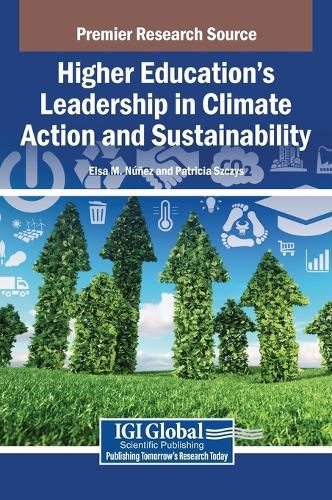Readings Newsletter
Become a Readings Member to make your shopping experience even easier.
Sign in or sign up for free!
You’re not far away from qualifying for FREE standard shipping within Australia
You’ve qualified for FREE standard shipping within Australia
The cart is loading…






This title is printed to order. This book may have been self-published. If so, we cannot guarantee the quality of the content. In the main most books will have gone through the editing process however some may not. We therefore suggest that you be aware of this before ordering this book. If in doubt check either the author or publisher’s details as we are unable to accept any returns unless they are faulty. Please contact us if you have any questions.
Higher education institutions are positioned to lead the global response to climate change and drive progress toward sustainability. Through their core missions of education, research, and community engagement, universities and colleges serve as innovation hubs for developing climate solutions, shaping public policy, and preparing the next generation of environmental leaders. By integrating sustainability into curricula, reducing campus carbon footprints, and fostering interdisciplinary collaboration, higher education plays a critical role in modeling and advancing systemic change. As institutions with global reach and influence, universities have both the opportunity and the responsibility to lead by example in addressing today s environmental challenges. Higher Education s Leadership in Climate Action and Sustainability explores the ways in which higher education tackles climate change and inspires the next generation of leaders to take decisive action. It examines how institutions in higher education lead by example, providing the skills and knowledge students require to meet the challenges of climate change and sustainable development in their future workplaces and communities. This book covers topics such as ethics and law, curricula, and climate change, and is a useful resource for policymakers, educators, climatologists, academicians, researchers, and environmental scientists.
$9.00 standard shipping within Australia
FREE standard shipping within Australia for orders over $100.00
Express & International shipping calculated at checkout
This title is printed to order. This book may have been self-published. If so, we cannot guarantee the quality of the content. In the main most books will have gone through the editing process however some may not. We therefore suggest that you be aware of this before ordering this book. If in doubt check either the author or publisher’s details as we are unable to accept any returns unless they are faulty. Please contact us if you have any questions.
Higher education institutions are positioned to lead the global response to climate change and drive progress toward sustainability. Through their core missions of education, research, and community engagement, universities and colleges serve as innovation hubs for developing climate solutions, shaping public policy, and preparing the next generation of environmental leaders. By integrating sustainability into curricula, reducing campus carbon footprints, and fostering interdisciplinary collaboration, higher education plays a critical role in modeling and advancing systemic change. As institutions with global reach and influence, universities have both the opportunity and the responsibility to lead by example in addressing today s environmental challenges. Higher Education s Leadership in Climate Action and Sustainability explores the ways in which higher education tackles climate change and inspires the next generation of leaders to take decisive action. It examines how institutions in higher education lead by example, providing the skills and knowledge students require to meet the challenges of climate change and sustainable development in their future workplaces and communities. This book covers topics such as ethics and law, curricula, and climate change, and is a useful resource for policymakers, educators, climatologists, academicians, researchers, and environmental scientists.